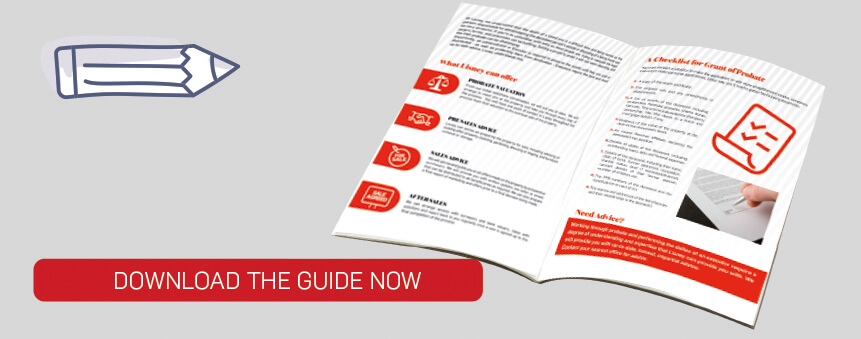How to sell a house in probate – the really useful Irish guide
8th June 2016

The death of a loved one, relative or friend is a difficult time, and being named as one of the people responsible for executing the will can lead to extra stress.
If you’re as unfamiliar with wills as most people are, trying to navigate the legal jargon, terms, and processes can be baffling. Selling a property under a will can seem daunting, and the Irish probate process is a hurdle in itself.
No two estates are the same, but this information should answer some of your questions about selling a house in probate.
What is probate?
Probate is the legal term for distributing the estate of a deceased person according to his/her will. In plain English, this means that for the property and any assets left in their will to transfer to the people they chose, the will must go through the probate process.
Everyone’s estate must be distributed in a certain way; for example, a deceased’s debts and taxes must be paid from their estate before those named in the will receive their inheritance. The rules of the probate process ensure the legal transfer of the estate is as the deceased wanted.
The will name an Executor, usually, a family member or trusted friend, who will be responsible for ensuring the deceased’s wishes are carried out as outlined in their will.
What does it mean for me if I’m selling a house in probate?
If you’re the Executor and you want to sell the property or the sale of the property is necessary in order to distribute the estate, it will require a Grant of Probate in order for the sale to close. A Grant of Probate essentially guarantees a will is valid and confirms the will as the last will of the deceased.
The Executor applies to the Probate Office for a Grant of Probate, an application that can be made in person or through a solicitor. The Grant of Probate allows the Executor to distribute the estate according to the will.
What’s involved in selling a house in probate?
The process of selling the house can begin before the Grant of Probate is in place – the property can be put up for sale, you can receive offers and a sale can be agreed upon prior to the probate being granted. However, the sale can’t close until the Grant of Probate is secured.
The length of time it takes to get the Grant of Probate can vary depending on how complicated or vast the deceased’s estate is and the current backlog in the Probate Office.
However, if you are planning on selling the property, placing it on the market sooner rather than later is advised for two reasons:
1. Selling provides the most accurate valuation – you must have a valuation of the property for your Grant of Probate, and a valuation is a theoretical sales price. If you get a sale agreed upon, you’ve likely accepted the best bid you could get, providing the real value of the property.
2. It can speed up the completion of probate, which can be a slow process. If a sale is agreed upon, a solicitor can usually apply to the Probate Office to speed up the process, to avoid drawing it out or the sale being lost.
You can begin the house selling process as you would if you were selling your own home, and in the meantime begin the probate application, using the following checklist to gather the information you need.
What will I need? A checklist for Grant of Probate
You can contact a solicitor to make the application, or with more straightforward estates, sometimes executors make personal applications. Either way, you’ll need to gather the following documents:
1. A copy of the death certificate.
2. The original will and any amendments or attachments.
3. A list of assets of the deceased, including properties, financial accounts, shares, bonds, cars etc. This is to include evidence of property ownership, like title deeds to a house and mortgage details, if any.
4. Evidence of the value of the property at the date of the deceased’s death.
5. An Inland Revenue affidavit, declaring the deceased’s tax position.
6. Details of debts of the deceased, including outstanding loans, bills and funeral expenses.
7. Details of the deceased, including their name, date of birth, former addresses, occupation, marital status (and if separated/divorced, contact details of their former spouse), number of children, etc.
8. The PPS numbers of the deceased and the beneficiaries or next of kin.
9. The names and addresses of the beneficiaries and their relationship to the deceased.
Want to know more about selling a house in probate?
Download our free short ebook so you can see what you need to do, step-by-step. Click the image below or this link to download the guide now.
Looking to sell a house in probate?
At Lisney, we are experts in selling houses, including those in probate. If you have questions about selling, get in touch, or follow us on Facebook and Twitter.
*This information is provided as a guide only. It is always advisable to seek legal advice in matters of probate or in relation to the sale of any property.

